I'm trying to resolve below issue: I need to prepare table that consists 3 columns: user_id, month value. Each from over 200 users has got different values of parameters that determine expected value which are: LOB, CHANNEL, SUBSIDIARY. So I decided to store it in table ASYSTENT_GOALS_SET. But I wanted to avoid multiplying rows and thought it would be nice to put all conditions as a part of the code that I would use in "where" clause further in procedure. So, as an example - instead of multiple rows:

I created such entry:

So far I created testing table ASYSTENT_TEST (where I collect month and value for certain user). I wrote a piece of procedure where I used BULK COLLECT.
declare
type test_row is record
(
month NUMBER,
value NUMBER
);
type test_tab is table of test_row;
BULK_COLLECTOR test_tab;
p_lob varchar2(10) :='GOSP';
p_sub varchar2(14);
p_ch varchar2(10) :='BR';
begin
select subsidiary into p_sub from ASYSTENT_GOALS_SET where user_id='40001001';
execute immediate 'select mc, sum(ppln_wartosc) plan from prod_nonlife.mis_report_plans
where report_id = (select to_number(value) from prod_nonlife.view_parameters where view_name=''MIS'' and parameter_name=''MAX_REPORT_ID'')
and year=2017
and month between 7 and 9
and ppln_jsta_symbol in (:subsidiary)
and dcs_group in (:lob)
and kanal in (:channel)
group by month order by month' bulk collect into BULK_COLLECTOR
using p_sub,p_lob,p_ch;
forall x in BULK_COLLECTOR.first..BULK_COLLECTOR.last insert into ASYSTENT_TEST values BULK_COLLECTOR(x);
end;
So now when in table ASYSTENT_GOALS_SET column SUBSIDIARY (varchar) consists string 12_00_00 (which is code of one of subsidiary) everything works fine. But the problem is when user works in two subsidiaries, let say 12_00_00 and 13_00_00. I have no clue how to write it down. Should SUBSIDIARY column consist: '12_00_00','13_00_00' or "12_00_00","13_00_00" or maybe 12_00_00','13_00_00 I have tried a lot of options after digging on topics like "Deling with single/escaping/double qoutes". Maybe I should change something in execute immediate as well?
Or maybe my approach to that issue is completely wrong from the very beginning (hopefully not :) ). I would be grateful for support.